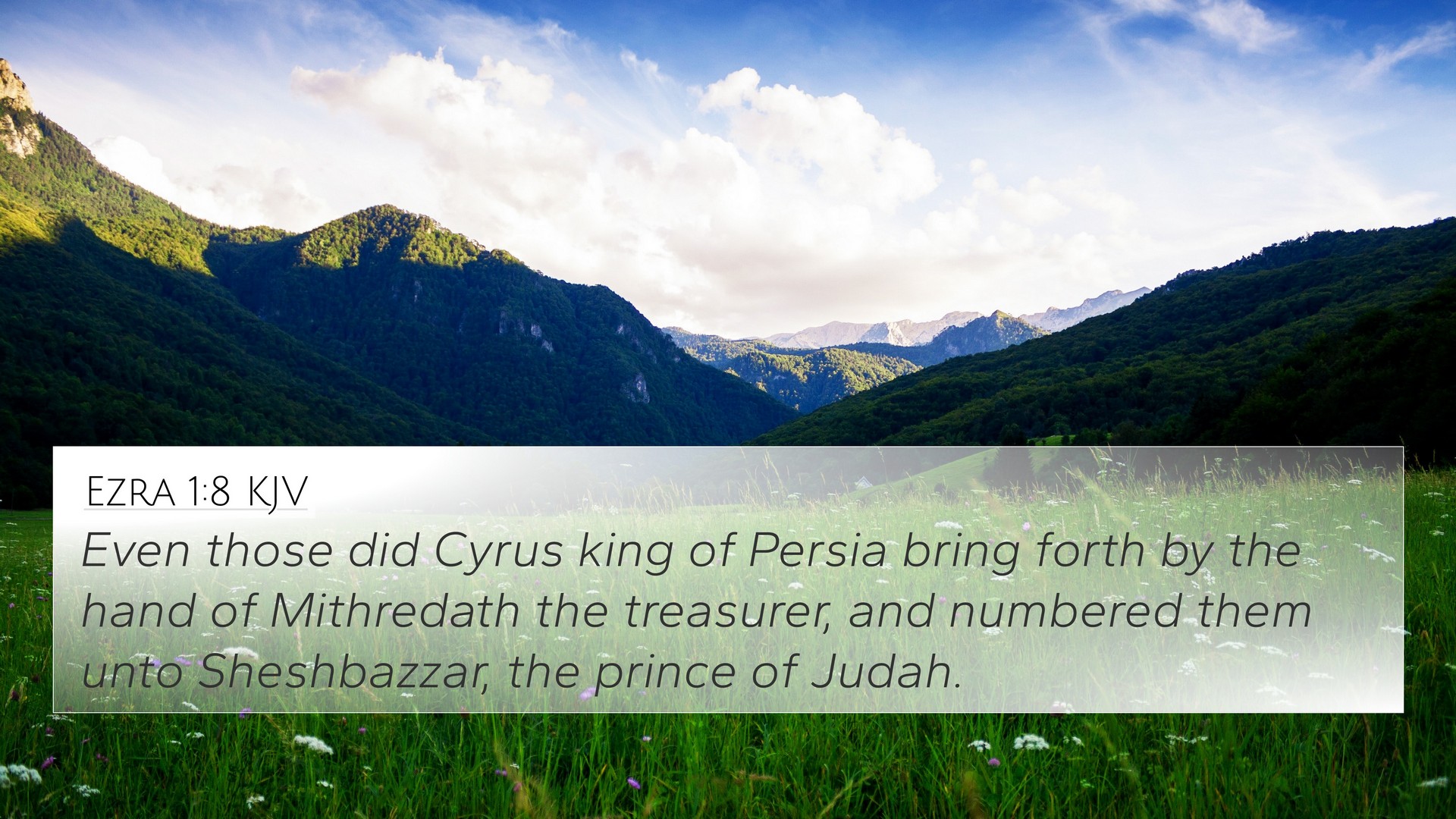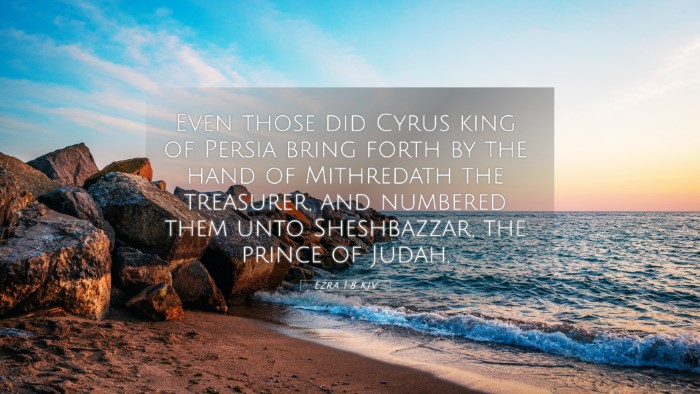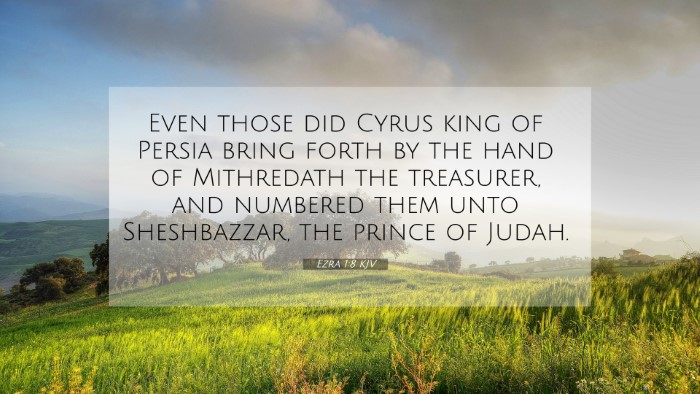Old Testament
Genesis Exodus Leviticus Numbers Deuteronomy Joshua Judges Ruth 1 Samuel 2 Samuel 1 Kings 2 Kings 1 Chronicles 2 Chronicles Ezra Nehemiah Esther Job Psalms Proverbs Ecclesiastes Song of Solomon Isaiah Jeremiah Lamentations Ezekiel Daniel Hosea Joel Amos Obadiah Jonah Micah Nahum Habakkuk Zephaniah Haggai Zechariah MalachiEzra 1:8 Similar Verses
Ezra 1:8 Cross References
Even those did Cyrus king of Persia bring forth by the hand of Mithredath the treasurer, and numbered them unto Sheshbazzar, the prince of Judah.
Uncover the Rich Themes and Topics of This Bible Verse
Listed below are the Bible themes associated with Ezra 1:8. We invite you to explore each theme to gain deeper insights into the Scriptures.
Ezra 1:8 Cross Reference Verses
This section features a detailed cross-reference designed to enrich your understanding of the Scriptures. Below, you will find carefully selected verses that echo the themes and teachings related to Ezra 1:8 KJV. Click on any image to explore detailed analyses of related Bible verses and uncover deeper theological insights.
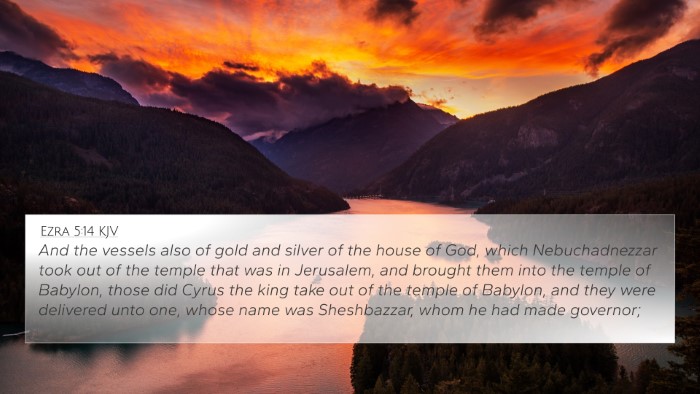
Ezra 5:14 (KJV) »
And the vessels also of gold and silver of the house of God, which Nebuchadnezzar took out of the temple that was in Jerusalem, and brought them into the temple of Babylon, those did Cyrus the king take out of the temple of Babylon, and they were delivered unto one, whose name was Sheshbazzar, whom he had made governor;

Ezra 1:11 (KJV) »
All the vessels of gold and of silver were five thousand and four hundred. All these did Sheshbazzar bring up with them of the captivity that were brought up from Babylon unto Jerusalem.
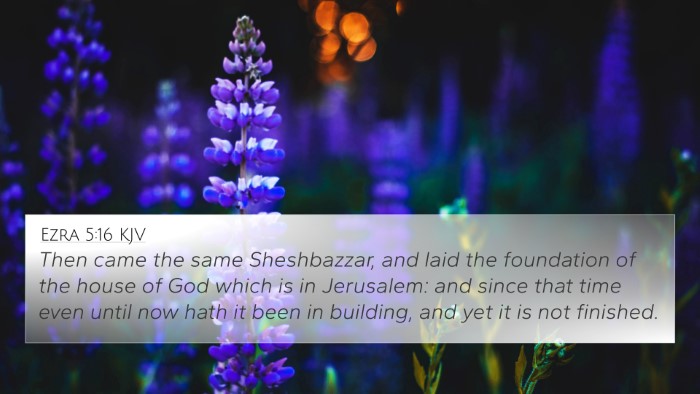
Ezra 5:16 (KJV) »
Then came the same Sheshbazzar, and laid the foundation of the house of God which is in Jerusalem: and since that time even until now hath it been in building, and yet it is not finished.
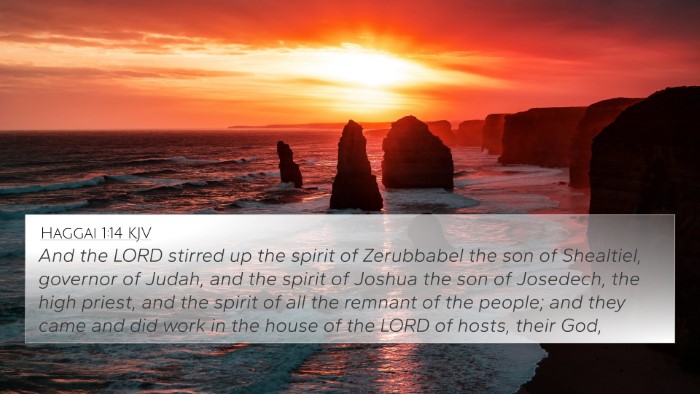
Haggai 1:14 (KJV) »
And the LORD stirred up the spirit of Zerubbabel the son of Shealtiel, governor of Judah, and the spirit of Joshua the son of Josedech, the high priest, and the spirit of all the remnant of the people; and they came and did work in the house of the LORD of hosts, their God,
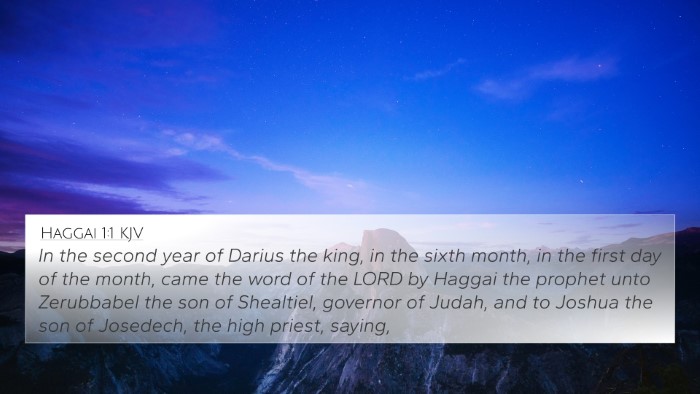
Haggai 1:1 (KJV) »
In the second year of Darius the king, in the sixth month, in the first day of the month, came the word of the LORD by Haggai the prophet unto Zerubbabel the son of Shealtiel, governor of Judah, and to Joshua the son of Josedech, the high priest, saying,
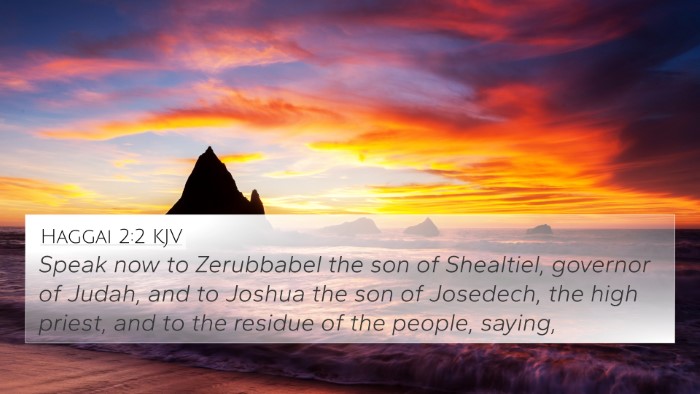
Haggai 2:2 (KJV) »
Speak now to Zerubbabel the son of Shealtiel, governor of Judah, and to Joshua the son of Josedech, the high priest, and to the residue of the people, saying,

Zechariah 4:6 (KJV) »
Then he answered and spake unto me, saying, This is the word of the LORD unto Zerubbabel, saying, Not by might, nor by power, but by my spirit, saith the LORD of hosts.
Ezra 1:8 Verse Analysis and Similar Verses
Meaning and Interpretation of Ezra 1:8
Ezra 1:8 states: "And Cyrus king of Persia brought forth the vessels of the house of the Lord, which Nebuchadnezzar had brought forth out of Jerusalem and had put them in the house of his gods."
This verse marks a significant moment in biblical history. It reflects the fulfillment of God's promise to restore His people and their worship after the Babylonian exile. The returning exiles were provided with the necessary resources and sacred vessels to rebuild the temple in Jerusalem.
Commentary Insights
Matthew Henry's Commentary
Matthew Henry highlights that this act of Cyrus is a testament to God's sovereignty and control over nations. Cyrus, although a pagan king, was chosen as an instrument to fulfill God's purpose. This demonstrates the theme of divine providence, whereby God uses even secular rulers to execute His will. Henry emphasizes the importance of the vessels, noting that their return symbolizes the restoration of true worship and the significance of holiness associated with them.
Albert Barnes' Commentary
Albert Barnes elaborates on the historical context, explaining that the vessels were originally taken from Solomon's temple by Nebuchadnezzar. The return of these sacred items signified a reestablishment of the worship of Yahweh in Jerusalem. Barnes draws connections to the prophetic words of Jeremiah regarding the return of the Israelites, emphasizing that this event was part of God's plan to gather His people back to their homeland.
Adam Clarke's Commentary
Adam Clarke notes the significance of Cyrus's decision as a political act fueled by divine inspiration. He points out the contrast between the oppression faced by the Jews in Babylon versus their restoration at the hands of a foreign king. Clarke also mentions that the return of the vessels represents a clean break from the past sins that led to exile, symbolizing hope and reconciliation with God.
Thematic Connections
Ezra 1:8 serves as a vital link in understanding various themes in the Bible:
- Restoration and Redemption: The context of the Babylonian exile and the promise of returning home.
- Divine Providence: God's ability to work through worldly leaders for His purposes.
- Worship and Holiness: The return of sacred items signifies the importance of proper worship.
- Fulfillment of Prophecy: The connection with the prophecies of Jeremiah and others.
Cross-References
This verse relates to several other Scripture passages that enhance its meaning:
- Isaiah 44:28: Prophecy of Cyrus as a shepherd who will perform God's pleasure.
- Jeremiah 29:10: Assurance of the Israelites’ return to their homeland after seventy years.
- 2 Chronicles 36:22-23: Similar account of Cyrus's decree to rebuild the temple.
- Haggai 1:1: God’s call to rebuild the temple during the reign of Darius.
- Zechariah 1:16: God's promise regarding Jerusalem's restoration.
- Psalm 126:1: A song of ascent reflecting joy in returning to Zion.
- Matthew 2:1-2: The recognition of Jesus as the King who fulfills prophecies.
Tools for Bible Cross-Referencing
For those interested in exploring the connections between Bible verses, consider using the following:
- Bible concordance: A tool to find where specific words and themes appear in Scripture.
- Bible cross-reference guide: Provides links between similar themes and verses.
- Cross-reference Bible study: Techniques for studying related scriptures in-depth.
- Bible reference resources: Books and online tools that compile relevant scriptures.
Conclusion
The verse in Ezra 1:8 not only narrates a historical event but encapsulates profound themes of restoration, divine sovereignty, and the faithfulness of God to His promises. By engaging with this text and its cross-references, believers can gain deeper insights into God's plan throughout biblical history. Utilizing tools for Bible cross-referencing helps in understanding the intricate connections that enrich our spiritual comprehension.
